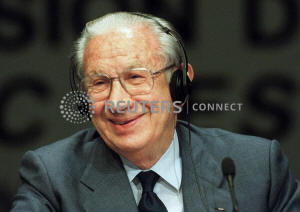Sport: On this day. Died April 21,
2010, IOC President Juan Antonio Samaranch
 Send a link to a friend
Send a link to a friend
 [April 20, 2020]
By Karolos Grohmann [April 20, 2020]
By Karolos Grohmann
ATHENS (Reuters) - Juan Antonio
Samaranch was the second-longest serving president of the
International Olympic Committee after its founder Pierre De
Coubertin, but the Spaniard left arguably a bigger mark in turning
the Games into the world's richest multi-sports event.
Samaranch, a Catalan who had served for years on local and national
positions under the regime of former dictator General Francisco
Franco in Spain, had also been involved in sports administration in
his home country.
He entered the IOC in 1966 and also led his country's Olympic
Committee.
An IOC Vice President from 1974 to 1978, he was elected president in
1980 and essentially carried the Games from the brink of financial
and political destruction to an era of unprecedented wealth, growth
and power.
That, however, ultimately led to the biggest corruption scandal the
organisation has ever seen.
Samaranch took over the IOC at a time when the Olympic movement was
in disarray following the financially disastrous 1976 Montreal
Olympics, a Games that also marked the start of a series of
boycotts.

Moscow in 1980 and Los Angeles in 1984 were also hit by major
boycotts but by then Samaranch, known for his deal-making abilities,
had already recognised the commercial potential of the Games.
Despite the Soviet Union's boycott of Los Angeles, the 1984 Olympics
were a massive financial success that turned things around for the
IOC.
The hugely profitable Games instantly breathed new life into the
event, turning the Olympics into an attractive prospect which cities
would fight over for decades to come, spending millions to bid for
them.
[to top of second column] |

Died on April 21, 2010: Juan Antonio Samaranch, IOC President
International Olympic Committee (IOC) President Juan Antonio
Samaranch smiles during a news conference at the end of a two-day
session on Olympic reform in Lausanne December 12. IOC leaders
agreed to ban members from visiting cities bidding to stage the
Olympics in response to the biggest corruption scandal in te
organisation's history. The measure is part of a reform package of
some 50 recommendations which have been passed by the session as the
IOC attempts to change the way it is run. REUTERS/Stringer/File
Photo

Samaranch, criticised by some for a perceived autocratic style and
for being too commercially driven in his decisions, also opened the
Games to professional athletes, guided China back into the Olympic
fold, while also attracting billions of dollars from major companies
as the IOC's own sponsors and broadcasters.
From a cash-strapped body serving amateur athletes, the Olympics
became a powerful force in professional sports under Samaranch.
When he stepped down after 21 years to be succeeded by Jacques
Rogge, Samaranch had cemented his position as the great renovator of
the Olympics.
But his departure in 2001 was also preceded by a corruption scandal
that saw 10 members forced out and several others issued with
warnings in the 1999 votes-for-gifts scandal involving Salt Lake
City's successful bid for the 2002 Winter Olympics.
That scandal left an indelible stain on Samaranch's Olympic legacy
and led to major reforms within the organisation.
(Editing by Peter Rutherford)
[© 2020 Thomson Reuters. All rights
reserved.] Copyright 2020 Reuters. All rights reserved. This material may not be published,
broadcast, rewritten or redistributed.
Thompson Reuters is solely responsible for this content.
 |